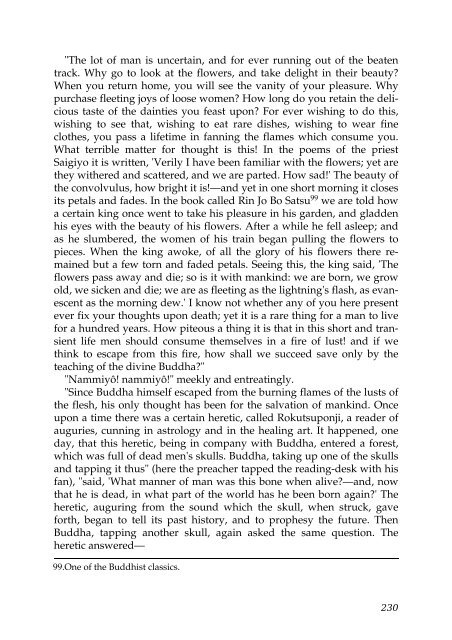You also want an ePaper? Increase the reach of your titles
YUMPU automatically turns print PDFs into web optimized ePapers that Google loves.
"The lot <strong>of</strong> man is uncertain, and for ever running out <strong>of</strong> the beaten<br />
track. Why go to look at the flowers, and take delight in their beauty?<br />
When you return home, you will see the vanity <strong>of</strong> your pleasure. Why<br />
purchase fleeting joys <strong>of</strong> loose women? How long do you retain the delicious<br />
taste <strong>of</strong> the dainties you feast upon? For ever wishing to do this,<br />
wishing to see that, wishing to eat rare dishes, wishing to wear fine<br />
clothes, you pass a lifetime in fanning the flames which consume you.<br />
What terrible matter for thought is this! In the poems <strong>of</strong> the priest<br />
Saigiyo it is written, 'Verily I have been familiar with the flowers; yet are<br />
they withered and scattered, and we are parted. How sad!' The beauty <strong>of</strong><br />
the convolvulus, how bright it is!—and yet in one short morning it closes<br />
its petals and fades. In the book called Rin Jo Bo Satsu 99 we are told how<br />
a certain king once went to take his pleasure in his garden, and gladden<br />
his eyes with the beauty <strong>of</strong> his flowers. After a while he fell asleep; and<br />
as he slumbered, the women <strong>of</strong> his train began pulling the flowers to<br />
pieces. When the king awoke, <strong>of</strong> all the glory <strong>of</strong> his flowers there remained<br />
but a few torn and faded petals. Seeing this, the king said, 'The<br />
flowers pass away and die; so is it with mankind: we are born, we grow<br />
old, we sicken and die; we are as fleeting as the lightning's flash, as evanescent<br />
as the morning dew.' I know not whether any <strong>of</strong> you here present<br />
ever fix your thoughts upon death; yet it is a rare thing for a man to live<br />
for a hundred years. How piteous a thing it is that in this short and transient<br />
life men should consume themselves in a fire <strong>of</strong> lust! and if we<br />
think to escape from this fire, how shall we succeed save only by the<br />
teaching <strong>of</strong> the divine Buddha?"<br />
"Nammiyô! nammiyô!" meekly and entreatingly.<br />
"Since Buddha himself escaped from the burning flames <strong>of</strong> the lusts <strong>of</strong><br />
the flesh, his only thought has been for the salvation <strong>of</strong> mankind. Once<br />
upon a time there was a certain heretic, called Rokutsuponji, a reader <strong>of</strong><br />
auguries, cunning in astrology and in the healing art. <strong>It</strong> happened, one<br />
day, that this heretic, being in company with Buddha, entered a forest,<br />
which was full <strong>of</strong> dead men's skulls. Buddha, taking up one <strong>of</strong> the skulls<br />
and tapping it thus" (here the preacher tapped the reading-desk with his<br />
fan), "said, 'What manner <strong>of</strong> man was this bone when alive?—and, now<br />
that he is dead, in what part <strong>of</strong> the world has he been born again?' The<br />
heretic, auguring from the sound which the skull, when struck, gave<br />
forth, began to tell its past history, and to prophesy the future. Then<br />
Buddha, tapping another skull, again asked the same question. The<br />
heretic answered—<br />
99.One <strong>of</strong> the Buddhist classics.<br />
230



